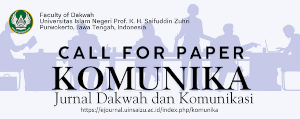Pembelajaran Public Speaking di Pondok Pesantren untuk Moderasi Indonesia
DOI:
https://doi.org/10.24090/komunika.v11i2.1370Keywords:
Learning, public Speaking, pesantrenAbstract
This study focused on public speaking learning process for Indonesian moderation located at An Najah, Al Amin and Darussalam as pesantren partners of IAIN Purwokerto. Public Speaking learning process in pesantren has been conducted for long period of time and it has distinctive characters to be studied. This study is using explorativephenomenological methodology to uncovered this learning process. Data is collected using observation, interview and documentation. Result shows that public speaking and speaking techniques in general is mandatory subject for An Najah, Al Amin dan Darussalam. The objectives of Public speaking learning in those three pesantren is that the students could conveyed Islamic value and religion effectively. Public speaking is conducted in many methods and activities, such as muhadharah, discussion, role play on many programs and events where santri has responsibilities and authority for managing the process. There are differences in practising muhadharah on those three pesantrens. There are also workshops hosted by experts. With that the process of public speaking learning is more in practical way without theoretical-conceptual background. This results in public speaking theoretical concepts is rarely mastered, whereas pesantren is well known for its rich oral speech tradition.Downloads
Download data is not yet available.
References
Ambarwati, S. (2014). Peningkatan Kemampuan Berbicara di Depan Kelas Melalui Bimbingan Kelompok dengan Teknik Bermain Peran. Jurnal Ilmiah Pendidikan Bimbingan dan Konseling, 2(1).
Book, C. L. (1980). Human Communcation: Principles, Context and Skill. New York: St. Martins Press.
Carnegie, D., & Berg, E. (2013). The Art of Public Speaking. Jakarta: Transmedia Pustaka.
DeVito, J. A. (1991). Human Communication, The Basic Course. New York: Heaver Collins Publisher.
DeVito, J. A. (2009). The Essential Element of Public Speaking. USA: Pearson.
Griffin, E. (1991). A First Look at Communication Theory Fifth Edition. New York: McGraw Hill.
Guba, E. G., & Lincoln, Y. S. (1994). Competing Paradigm in Qualitative Research, dalam Norman K. Denzin dan Yvonna S. Lincoln, Handbook od Qualitative Research. London: Sage Publication.
Irawan, P. (2006). Penelitian Kualitatif dan Kuantitatif untuk Ilmu-ilmu Sosial. Jakarta: Departemen Ilmu Administrasi FISIP UI.
Littlejohn, S. W. (1992). Theories of Human Communication, Fifth Edition. California: Wadsworth Publishing.
Meleong, L. J. (1998). Metodologi Penelitian Kualitatif. Bandung: Remaja Rosdakarya.
Mulyana, D. (2008). Metodologi Penelitian Kualitatif, Paradigma Baru Ilmu Komunikasi dan Ilmu Sosial Lainnya. Bandung: Remaja Rosdakarya.
NN. (TT). Kepercayaan Diri Siswa di Pesantren Darul Hikmah Medan. Medan: Universitas Sumatra Utara.
Rakhmat, J. (2008). Retorika Modern, Suatu Pendekatan Praktis. Bandung: Remaja Rosdakarya.
Salim, A. (1991). Teori dan Paradigma Penelitian Sosial. Yogyakarta: Tiara Wacana.
Samir Al-Syawi, M. (2002). ‘Ilm al-Khitobah. Damaskus: Daar al-Ashoma.
Sutopo, H. (1988). Pengantar Penelitian Kualitatif: Dasar-dasar Teori dan Praktis. Surakarta: UNS Press.
Tim Penyusun. (2008). Kurikulum Jurusan Dakwah STAIN Purwokerto. Purwokerto: Jurusan Dakwah STAIN Purwokerto.
Tim Penyusun. (2016). Panduan Akademik IAIN Purwokerto 2016-2017. Purwokerto: STAIN Press.
Tim Penyusun. (2017). Profil Pondok Pesantren Darussalam Dukuhwaluh Purwokerto. Purwokerto: Darussalam.
Book, C. L. (1980). Human Communcation: Principles, Context and Skill. New York: St. Martins Press.
Carnegie, D., & Berg, E. (2013). The Art of Public Speaking. Jakarta: Transmedia Pustaka.
DeVito, J. A. (1991). Human Communication, The Basic Course. New York: Heaver Collins Publisher.
DeVito, J. A. (2009). The Essential Element of Public Speaking. USA: Pearson.
Griffin, E. (1991). A First Look at Communication Theory Fifth Edition. New York: McGraw Hill.
Guba, E. G., & Lincoln, Y. S. (1994). Competing Paradigm in Qualitative Research, dalam Norman K. Denzin dan Yvonna S. Lincoln, Handbook od Qualitative Research. London: Sage Publication.
Irawan, P. (2006). Penelitian Kualitatif dan Kuantitatif untuk Ilmu-ilmu Sosial. Jakarta: Departemen Ilmu Administrasi FISIP UI.
Littlejohn, S. W. (1992). Theories of Human Communication, Fifth Edition. California: Wadsworth Publishing.
Meleong, L. J. (1998). Metodologi Penelitian Kualitatif. Bandung: Remaja Rosdakarya.
Mulyana, D. (2008). Metodologi Penelitian Kualitatif, Paradigma Baru Ilmu Komunikasi dan Ilmu Sosial Lainnya. Bandung: Remaja Rosdakarya.
NN. (TT). Kepercayaan Diri Siswa di Pesantren Darul Hikmah Medan. Medan: Universitas Sumatra Utara.
Rakhmat, J. (2008). Retorika Modern, Suatu Pendekatan Praktis. Bandung: Remaja Rosdakarya.
Salim, A. (1991). Teori dan Paradigma Penelitian Sosial. Yogyakarta: Tiara Wacana.
Samir Al-Syawi, M. (2002). ‘Ilm al-Khitobah. Damaskus: Daar al-Ashoma.
Sutopo, H. (1988). Pengantar Penelitian Kualitatif: Dasar-dasar Teori dan Praktis. Surakarta: UNS Press.
Tim Penyusun. (2008). Kurikulum Jurusan Dakwah STAIN Purwokerto. Purwokerto: Jurusan Dakwah STAIN Purwokerto.
Tim Penyusun. (2016). Panduan Akademik IAIN Purwokerto 2016-2017. Purwokerto: STAIN Press.
Tim Penyusun. (2017). Profil Pondok Pesantren Darussalam Dukuhwaluh Purwokerto. Purwokerto: Darussalam.
Downloads
Published
2018-04-13
Issue
Section
Articles
License
Authors who publish with this journal agree to the following terms:
- Authors retain copyright and grant the journal right of first publication with the work simultaneously licensed under a Creative Commons Attribution-ShareAlike 4.0 International License that allows others to share the work with an acknowledgement of the work's authorship and initial publication in this journal.
- Authors are able to enter into separate, additional contractual arrangements for the non-exclusive distribution of the journal's published version of the work (e.g., post it to an institutional repository or publish it in a book), with an acknowledgement of its initial publication in this journal.
- Authors are permitted and encouraged to post their work online (e.g., in institutional repositories or on their website) prior to and during the submission process, as it can lead to productive exchanges, as well as earlier and greater citation of published work (See The Effect of Open Access).





























